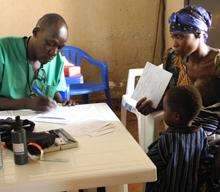MSF is combatting a malaria outbreak in the remote Ganga-Dingila health region.
A malaria outbreak has struck several regions of Orientale province in northwest Democratic Republic of Congo (DRC). In early June, Doctors Without Borders/Médecins Sans Frontières (MSF) sent an emergency team into the Ganga-Dingila health region, where approximately 118,000 people live in isolated, hard-to-reach communities that lack access to medical care.
Two tiny caskets covered with fresh dirt lay sit in front of a house on the road connecting the towns of Dingila, the administrative center of the area, and Zobia. Jeanne, a young mother, stands by mutely. "She can't speak—she is too sad," explains a neighbor. "Her children died."
More than 18 people in this small village have died in five months. Most were children. Last year, no one died from malaria, which is endemic in the area. But since the beginning of 2012, unusually high rates of malaria and severe anemia—along with exceptionally high mortality rates—have been recorded in Ganga-Dingila. "People say they have never seen anything like this," says Dr. Narcisse Wega, MSF's emergency coordinator, who arrived in June to launch medical activities in the region. "Some parents have lost two or three children in just a few weeks.”
The situation has engendered a profound sense of loss within the communities. "Other regions of the province seem to be affected by this as well, but we cannot yet explain it," says Dr. Mathieu Bichet, MSF's medical director in Geneva. "An investigation is underway. However, we can say that it is exacerbated by problems related to access to health care facilities and the lack of drugs."
Since June, MSF has been using all available resources to provide free care to people throughout the region, setting up treatment and intensive care units, supplying drugs to health care facilities, and organizing the transfer of seriously ill patients to MSF-supported hospitals. MSF is also training national health employees to provide a very effective artemisinin-based treatment for malaria. This treatment is injected intravenously to treat the most severe cases. Children who receive it recover in a few days.
MSF is the only medical humanitarian organization in Ganga-Dingila, and it is working with the Ministry of Health to make treatment available the region’s most isolated areas. Previously, some patients had to travel more than 60 kilometers [about 37 miles] to receive care, delaying treatment and increasing the risk of serious medical complications and death.
MSF's logistical teams have rebuilt bridges and a landing strip, allowing motorcycles and planes to supply the area on a regular basis. "The needs are enormous and Zobia is very out of the way, so it's difficult to get supplies there," explains Gilles Koukpo, the MSF doctor in charge of the malaria team in Zobia. "Motorcycles have to travel more than six hours on a narrow, windy road and cross a series of broken-down bridges to deliver small quantities of medicine."
Health care facilities receiving MSF support in the Zobia-Dingila area have observed a sharp drop in mortality since June, and MSF is currently expanding its activities to provide aid to other remote communities in DRC.
An appeal was issued in early July for additional resources from other humanitarian organizations working in Orientale to help stop the spread of the illness, primarily through prevention activities. "We cannot currently carry out mass distributions of insecticide-treated mosquito nets, which are a good way to prevent the transmission of malaria," says Dr. Bichet. "We have to focus all our resources on treating as many people as possible. However, it is critical that other actors organize quickly."
From June 20 to July 20, 2012, MSF treated more than 7,000 people on an outpatient basis in the Ganga-Dingila health region and hospitalized over 740, including more than 180 who received transfusions for severe anemia. In 2011, MSF treated over 158,000 people for Malaria throughout DRC.




